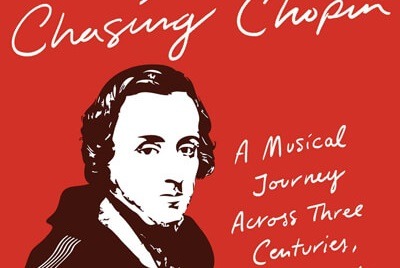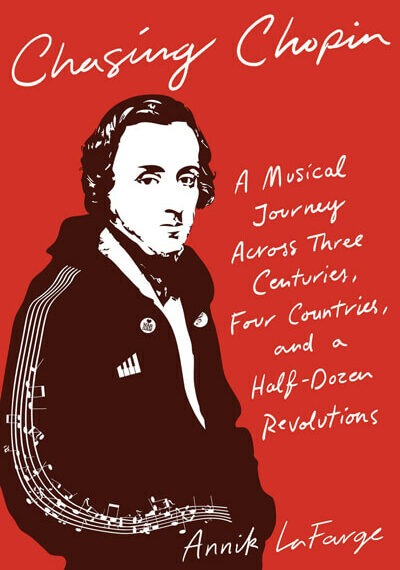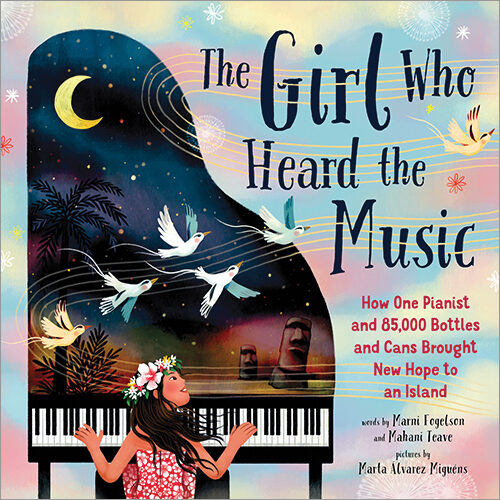
BOOK REVIEW: Chasing Chopin: A Musical Journey Across Three Centuries, Four Countries, And A Half-Dozen Revolutions

This review originally ran on March 2, 2022.
“All art is political, but not all artists are politicians. However, artists also understand the clear difference between patriotism and active political support of one’s nation’s current government.”
Those words, issued by the Munich-based manager of the internationally-acclaimed—and now politically-reviled—conductor Valery Gergiev, announced that the agency, Felsner Artists, has cut loose this celebrated client. This was just the latest consequence of Gergiev’s continued vocal support of Vladimir Putin. Carnegie Hall, La Scala, festivals: Gergiev– the Artistic and General Director of Russia’s state-owned Mariinsky Theatre–has received the cold shoulder from them all.
As an opener to the week that includes the anniversary of Frederic Chopin’s birth, March 1, the story hit especially close to home. Chopin’s home. Poland. This time, it’s a neighbor’s refugees crossing its borders, fleeing the latest authoritarian power play.
What a time to be reading Chasing Chopin: A Musical Journey Across Three Centuries, Four Countries, and a Half-Dozen Revolutions (Simon & Schuster, 2021) by Annik LaFarge. As the author tells it, “Poland was literally erased from the map and its name banned from official use,” from the 1770s, when Russia, Austria, and Prussia partitioned it, to the end of World War I. Chopin’s legendary longing for his homeland translates all too well into the stories of today’s heartbroken refugees.
LaFarge’s Chopin journey began with an email to the creator of the video game “Frederic: The Resurrection of Music” during the 200th anniversary year of Chopin’s birth. An amateur pianist, she wanted to explore the game’s use of Chopin’s iconic “funeral march.” Of course, like all explorers, she couldn’t stop there. The years, and her travels, unroll—2010, 2011, 2012—as she touches, and allows the reader to touch, the patriotic struggles and intimate relationships of Chopin’s life. She views it all through the lens of this famous march, and the Piano Sonata No. 2 in B-flat minor, Op. 35, of which it is, after all, only one small part. It turns out that Chopin crossed out the word “funeral” on the score of that iconic third movement march. This, too, was a protest: the singular keyboard artist against the popularity of over-the-top excesses in memorial music by contemporaries like Berlioz.
Adventurers recognize each other. LaFarge (whose pre-pandemic travels, at this reading, are the stuff of dreams) introduces Chopin as a twenty-year-old adventurer, bouncing from Dresden to Vienna, Salzburg to Munich, enjoying concerts, hanging out with friends, packing a little of the homeland with him: some Polish dirt in a silver cup. When the event known as the November (1830) Revolution breaks out, his friends go home to fight, but insist that he stay in Europe and “use his music to give voice to Poland’s struggle.”
Yes, there is George Sand. In tracing the journey of one Chopin sonata, LaFarge breathes the air of their shared retreats, managing to flesh out the personality of the composer’s famous companion.
Sand’s own struggles as a literary artist receive generous attention. So do her struggles as the mother of a son and a daughter, whose relationships with Chopin often proved more comforting to him than their mother’s. So do the historic instruments on which Chopin played, which LaFarge hunts down in collections from Massachusetts to Majorca.
As a person all too familiar with the “down the rabbit hole” experience of chasing an idea online, I recommend sharing LaFarge’s report of her real-life travels through Chopin’s Europe. Luxuriate in the endnotes, in the readings she devoured and the music she surrounded herself with, in pursuit of the world that gave birth to one singular work of art. A companion website offers, chapter by chapter, click-through audio of every piece of music cited in the book. Following a famous tune associated with death, Chasing Chopin catches its subject and brings him back almost alive.
Related Stories:

Music Moment: The Boulanger Initiative
Quick: name a classical music composer. Chances are, the first names that come up are not women.
Now there’s a new database that opens up centuries of women composers, linking their names to stories, performing scores, and recordings

BOOK REVIEW: The Girl Who Heard The Music
When’s the last time you watched a Tiny Desk Concert? NPR’s popular in-office show became the Tiny Desk (Home) Concert when the pandemic hit. On June 24, 2021, one artist’s home studio performance came from a remote island in the south Pacific Ocean, two thousand miles west of Chile. The pianist Mahani Teave (teh-AH-veh) offered not only Handel and Chopin, but also a tour of the music school she helped to build on the island of Rapa Nui, where she grew up.

BOOK REVIEW: Chasing Chopin: A Musical Journey Across Three Centuries, Four Countries, And A Half-Dozen Revolutions
LaFarge’s Chopin journey began with an email to the creator of the video game “Frederic: The Resurrection of Music” during the 200th anniversary year of Chopin’s birth. An amateur pianist, she wanted to explore the game’s use of Chopin’s iconic “funeral march.” Of course, like all explorers, she couldn’t stop there.















